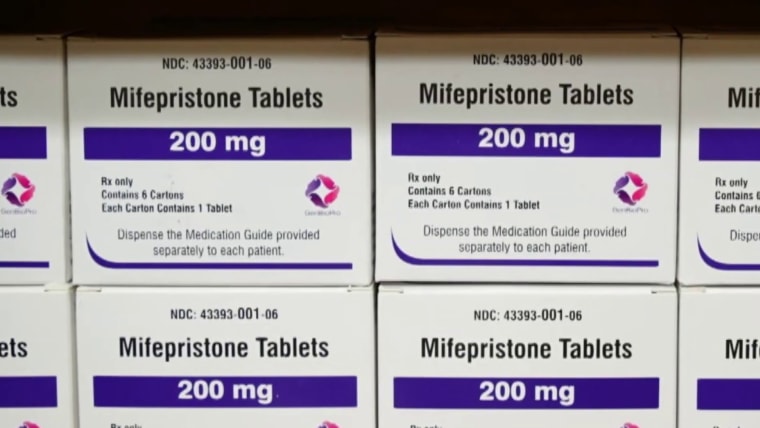Good, albeit a bit confusing at this point in time.
A dozen Democratic state attorneys general have opened a new front in the legal war over mifepristone, the “gold standard” medication used in the majority of all US abortions. In a federal lawsuit filed Thursday, the AGs—from states including Arizona, Illinois, and Washington—accuse the Food and Drug Administration of imposing unnecessarily “onerous” restrictions on mifepristone, which is used in combination with the anti-ulcer drug misoprostol to end pregnancies in the first 10 weeks.
The drug has a sterling safety record and has been used by an estimated 5.6 million people since it was approved by the FDA more than 22 years ago. Nevertheless, the FDA has long subjected mifepristone to a set of unusual restrictions known as a “Risk Evaluation and Mitigation Strategy” (REMS). The agency only applies these extra rules, such as a requirement that prescribers receive a special certification, to a few dozen drugs—typically high-risk medications like opioids, or injectable anti-psychotic sedatives. The inclusion of mifepristone on this list has long been controversial. “Many people believe that the strict restrictions on mifepristone reflect political concerns more so than concerns around the safety of the drug itself,” Temple University law dean Rachel Rebouché told me in June, the day the Supreme Court overturned Roe v. Wade.
Since then, a dozen states have outlawed abortion almost entirely. Medication abortion has only grown in importance as people who want to end their pregnancies in abortion-hostile states source the pills through telehealth, mail-forwarding services, and overseas pharmacies.
Yet while the FDA has recently loosened some of its rules on mifepristone—for instance, by allowing certified pharmacies to dispense it—the REMS remains in place. “FDA’s decision to continue these burdensome restrictions in January 2023 on a drug that has been on the market for more than two decades with only ‘exceedingly rare’ adverse events has no basis in science,” argues the complaint from the attorneys general. “It only serves to make mifepristone harder for doctors to prescribe, harder for pharmacies to fill, harder for patients to access, and more burdensome for the Plaintiff States and their health care providers to dispense.”
This isn’t the only legal battle over mifepristone. For the few weeks, abortion rights advocates have been waiting and watching as an anti-abortion, Trump-appointed judge in Texas considers issuing a nationwide ban on the drug. That case—brought by the religious-right legal group Alliance Defending Freedom—claims that the FDA “exceeded its regulatory authority” when it approved mifepristone in 2000; that the agency had overlooked potentially harmful side effects; and that a 19th-century anti-obscenity law forbids the mailing of abortion drugs. If the judge agrees and issues a temporary injunction, which he could do any day, mifepristone could be taken off the market everywhere from New York to California.
That case, about which I’m sure you’ve already read at least two alarmist articles, is the reason I’m a little confused by this. Who even knows what happens if that whackjob judge in Texas decides to make medication abortion illegal across the country? That said, I do appreciate an effort to go on the offensive. Daily Kos adds on.
The suit is spearheaded by Oregon Attorney General Ellen Rosenblum and Washington Attorney General Bob Ferguson. In January, the FDA updated the risk evaluation and mitigation strategy (REMS) for mifepristone to life the requirement that patients pick the medicine up in person from a pharmacy, making it simpler for pharmacies to fill the prescriptions online and through the mail. But the FDA kept a requirement under REMS that forces prescribers to obtain specific certifications, and requires extensive documentation that the AGs say could endanger both providers and patients.
The paper trail “puts both patients and providers in danger of violence, harassment, and threats of liability amid the growing criminalization and outlawing of abortion in other states,” the complaint states. That paperwork puts an unnecessary burden on healthcare providers and on patients, the AGs say in the suit.
Under the REMS, both doctor and patient are required to sign an agreement saying that the drug is being prescribed and the patient intends to take it to end a pregnancy. It doesn’t distinguish between an abortion or treatment for a miscarriage, and that agreement stays in a patient’s medical record.
The lawsuit also points out that there are just 60 drugs among more than 20,000 regulated by the FDA that it has imposed REMS on, that “cover dangerous drugs such as fentanyl and other opioids, certain risky cancer drugs, and highdose sedatives used for patients with psychosis.” It is “improper and discriminatory for FDA to relegate mifepristone … to the very limited class of dangerous drugs that are subject to a REMS.”
“FDA’s decision to continue these burdensome restrictions in January 2023 on a drug that has been on the market for more than two decades with only ‘exceedingly rare’ adverse events has no basis in science,” the AGs lawsuit says. “It only serves to make mifepristone harder for doctors to prescribe, harder for pharmacies to fill, harder for patients to access, and more burdensome for the Plaintiff States and their health care providers to dispense.”
“In this time when reproductive healthcare is under attack, our coalition of 12 states seeks to ensure that access to mifepristone—the predominant method of safe and effective abortion in the U.S.—is not unduly restricted,” Rosenblum said in a statement. “Our coalition stands by our belief that abortion is healthcare, and healthcare is a human right.” The other states joining the suit, filed in the Eastern District of Washington state, are Arizona, Colorado, Connecticut, Delaware, Illinois, Michigan, Nevada, New Mexico, Rhode Island, and Vermont.
The suit was filed in the Eastern District of Washington. I’d like to think that if the plaintiffs gets a favorable ruling, the FDA will not appeal. We’ll see where we even are when that happens.

